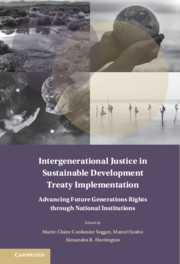 Intergenerational Justice in Sustainable Development Treaty Implementation
Intergenerational Justice in Sustainable Development Treaty Implementation Book contents
- Intergenerational Justice in Sustainable Development Treaty Implementation
- Treaty Implementation for Sustainable Development
- Intergenerational Justice in Sustainable Development Treaty Implementation
- Copyright page
- Contents
- Figures
- Tables
- Notes on Contributors
- Foreword
- Acknowledgements
- Abbreviations and Acronyms
- 1 Introduction
- 2 The Theoretical Framework for International Legal Principles of Intergenerational Equity and Implementation through National Institutions
- Part I Introduction to Treaty Law on Intergenerational Justice and Codifying Sustainability
- Part II Key Challenges in Domestic Implementation of Intergenerational Justice
- Part III Law and Policy Innovations for Intergenerational Justice
- Part IV Implementing Sustainability through National Institutions: Case Studies
- National Case Studies
- Comparative Insights
- 29 A Comparative Analysis of Model Institutions: Diversity in Reaching Common Goals
- 30 Comparing Progress in Intergenerational Governance
- 31 International Institutions for Future Generations and Democratic Legitimacy
- Part V Regional Trends in Intergenerational Justice
- Part VI Future Trends
- Afterword
- Table of Authorities
31 - International Institutions for Future Generations and Democratic Legitimacy
from Comparative Insights
Published online by Cambridge University Press: 15 October 2021
- Intergenerational Justice in Sustainable Development Treaty Implementation
- Treaty Implementation for Sustainable Development
- Intergenerational Justice in Sustainable Development Treaty Implementation
- Copyright page
- Contents
- Figures
- Tables
- Notes on Contributors
- Foreword
- Acknowledgements
- Abbreviations and Acronyms
- 1 Introduction
- 2 The Theoretical Framework for International Legal Principles of Intergenerational Equity and Implementation through National Institutions
- Part I Introduction to Treaty Law on Intergenerational Justice and Codifying Sustainability
- Part II Key Challenges in Domestic Implementation of Intergenerational Justice
- Part III Law and Policy Innovations for Intergenerational Justice
- Part IV Implementing Sustainability through National Institutions: Case Studies
- National Case Studies
- Comparative Insights
- 29 A Comparative Analysis of Model Institutions: Diversity in Reaching Common Goals
- 30 Comparing Progress in Intergenerational Governance
- 31 International Institutions for Future Generations and Democratic Legitimacy
- Part V Regional Trends in Intergenerational Justice
- Part VI Future Trends
- Afterword
- Table of Authorities
Summary
Arrival of the Anthropocene has focused attention on human beings’ impacts on functioning global ecosystems and made increasingly urgent the need to focus on global institutional reform. The Anthropocene involves the notion that we have entered into a new era in which human beings have permanently modified global ecosystems, including the climatic system. Evidence mounts that the Earth’s climatic system is approaching tipping points with potentially catastrophic consequences. This has led John Dryzek to call for a rethink of political institutions appropriate for this new era based on ‘ecosystemic reflexivity’ as a first overriding virtue. ‘Ecosystemic reflexivity’ involves incorporating better ways of listening to ecological systems with broader participation – taking in both nature and future generations – into human institutions.
- Type
- Chapter
- Information
- Intergenerational Justice in Sustainable Development Treaty ImplementationAdvancing Future Generations Rights through National Institutions, pp. 597 - 614Publisher: Cambridge University PressPrint publication year: 2021


